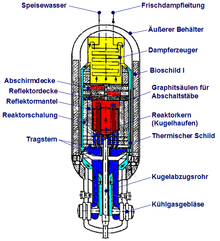Skyshine
(Radiation) skyshine describes the ionizing radiation emitted by a nuclear technical or medical facility, reaching the facility's surroundings not directly, but indirectly through reflection and scattering at the atmosphere back to earth's surface. This effect can happen, when the shielding barrier around the source of radiation is open at the top. In a wider sense, skyshine also describes radiation reflected off the ceiling inside a nuclear facility.[2][3][4]
The intensity of radiation measured at the surface immediately surrounding the facility increases with growing distance from the shielding barrier to reach a maximum and then fall again continuously with further increasing distance. Depending on the type of radiation the maximum is reached at different distances from the source of radiation. For example, x-rays emitted from linear accelerators reached maxima of 18 MeV at a distance of 13.6 m and 6 MeV at 4.6 m in studies.[2]

Between 1967 and 1975 significant radiation damage of the surroundings was caused by radiation skyshine at and near the AVR reactor in Jülich, Germany, which, in its original BBC construction, lacked a top shielding barrier.[5][6][7]
In 2011, the skyshine effect reached media attention in the controversy around the radioactive waste repository Gorleben after higher levels of radiation were measured outside the facility, despite it being shielded by a shielding wall.[8]
References
- ↑ Lagutina, I. S.; Mashkovich, V. P.; Stroganov, A. A.; Chernyaev, A. M. (February 1989). "Skyshine from photon radiation". Soviet Atomic Energy. Kluwer Academic Publishers / Plenum Publishers. 66 (2): 118–124. doi:10.1007/BF01121800. eISSN 1573-8205. ISSN 0038-531X. Retrieved 2016-05-17. (NB. Translation from the Russian journal Atomnaya Énergiya, pp. 103–106.)
- 1 2 Gossman, Michael S.; McGinley, Patton H.; Rising, Mary B.; Pahikkala, A. Jussi (May 2010) [2009-02-16]. "Radiation skyshine from a 6 MV medical accelerator". Journal of Applied Clinical Medical Physics (JACMP). 11 (3). Archived from the original on 2016-05-17. Retrieved 2016-05-17.
- ↑ Kase, K. R.; Edwards, M.; Gorson, R. O.; Ipe, N. E.; Kleck, J. H. (2005), "contribution", Structural Shielding Design and Evaluation for Megavoltage X- and Gamma-Ray Radiotherapy Facilities, by Deye, J. A.; Rodgers, J. E.; Wu, R. K.; Biggs, P. J.; McCall, R. C.; McGinley, P. H., National Council on Radiation Protection and Measurements (NCRP), ISBN 978-0-929600-87-1, ISBN 0-929600-87-8. Report No. 151, retrieved 2016-05-17
- ↑ "Verantwortung im Strahlenschutz bei Arbeiten in und mit Fremdfirmen" (PDF) (in German). Landesanstalt für Arbeitsschutz NRW. 2001-05-01. Retrieved 2011-11-27.
- ↑ Ministerium für Arbeit, Gesundheit und Soziales (MAGS NRW) / Atomaufsicht (1975-01-23), Dosisleistungen im AVR-Gelände und am Reaktorgebäude (in German), Düsseldorf, Germany, Geschäftszeichen III A 4–8944,65 (NB. In compliance with the German Umweltinformationsgesetz (UIG) this document can be inspected on request in the archive of the Ministerium für Arbeit, Gesundheit und Soziales (MAGS), Düsseldorf, Germany.)
- ↑ AVR GmbH (1975-07-17), Schreiben der AVR GmbH an das MAGS/Atomaufsicht (Düsseldorf), Jülich, Germany, Az H4-S5a4 Ku/Lö (NB. In compliance with the German Umweltinformationsgesetz (UIG) this letter can be inspected on request in the archive of the Ministerium für Arbeit, Gesundheit und Soziales (MAGS), Düsseldorf, Germany.)
- ↑ Langen, Andreas (2011-12-28). "Gebt uns die Kugel" (in German) (39). Kontext:Wochenzeitung. Archived from the original on 2016-05-17. Retrieved 2016-05-17. Langen, Andreas (2012-01-04). "Strahlendes Glanzstück" (in German) (40). Kontext:Wochenzeitung. Archived from the original on 2016-05-17. Retrieved 2016-05-17.
- ↑ Metzner, Wolfgang (2011-11-25). ""Skyshine" über dem Castor-Lager". stern (in German). Archived from the original on 2016-05-17. Retrieved 2016-05-17.
